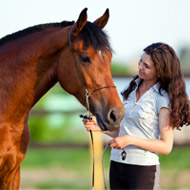BEVA issues insurance advice to horse owners

Horse owners are being urged to read their policy carefully and make sure they understand exactly what they are covered for.
The British Equine Veterinary Association (BEVA) are advising horse owners to keep their insurance details close to hand in case their animal requires emergency veterinary treatment.
The organisation believes this will help owners make informed decisions and will enable vets to quickly check the extent of cover - even in the middle of the night.
To help owners prepare for an emergency situation, BEVA and insurance firm KBIS have put together the following tips:
• Read your policy very carefully and make sure you understand exactly what you are covered for and the steps you must follow to ensure any claim is valid.
• Keep an up-to-date copy of your horse’s insurance certificate with your horse’s passport and keep these readily available in a safe place in your yard.
• Check your insurance policy every time it is renewed and note your excess, vets fee incident limit and exclusions.
• Discuss the proposed veterinary procedure and projected costs with your vet in line with your maximum cover limit and any contribution you are prepared to make if your incident limit is exceeded.
• Discuss with your vet whether referral to an equine hospital might be necessary before any of the more expensive diagnostic tests have been carried out. This may avoid duplication of the tests and help your insurance cover go further.
• Contact your insurance company as promptly as possible to make them aware of your potential claim. In some cases, your vet may do this for you.
• Your Insurance Company must be informed before euthanasia is carried out unless emergency euthanasia is required. Failure to do so may invalidate a claim for mortality.
“It is essential to check your insurance policy every time it is renewed and keep your insurer informed of any change in your horse’s health, or activities,” advises Guy Prest, managing director of KBIS British Equestrian Insurance.
He urges owners to pay particular attention to the excess payable in the event of a claim, the vet's fee incident limit and any exclusions on their policy due to pre-existing illness, injury or disease.



 The Animal and Plant Health Agency (APHA) has updated its online reporting service for dead wild birds.
The Animal and Plant Health Agency (APHA) has updated its online reporting service for dead wild birds.